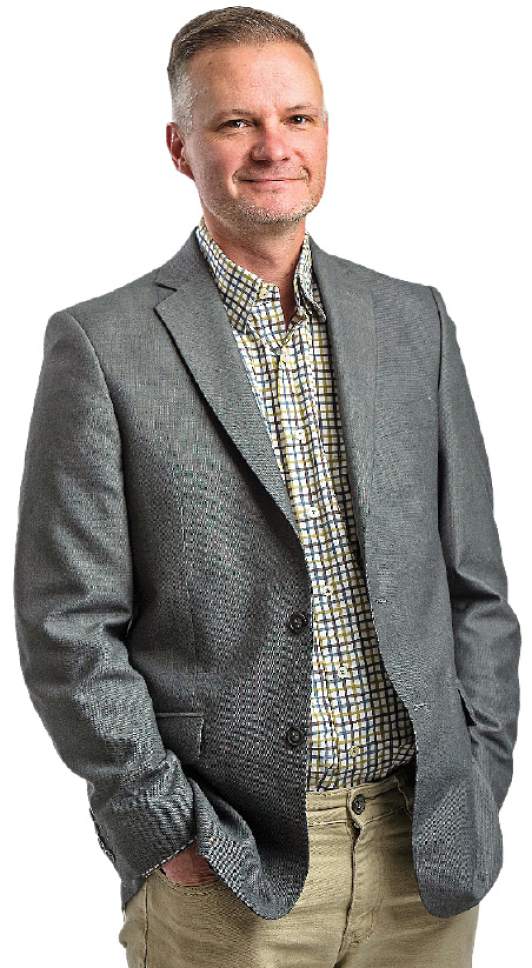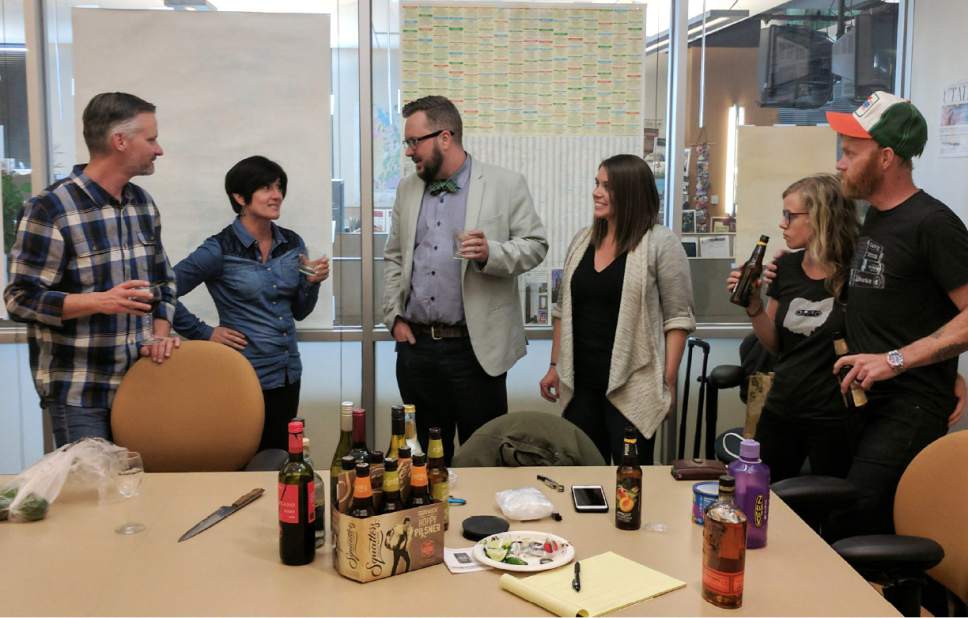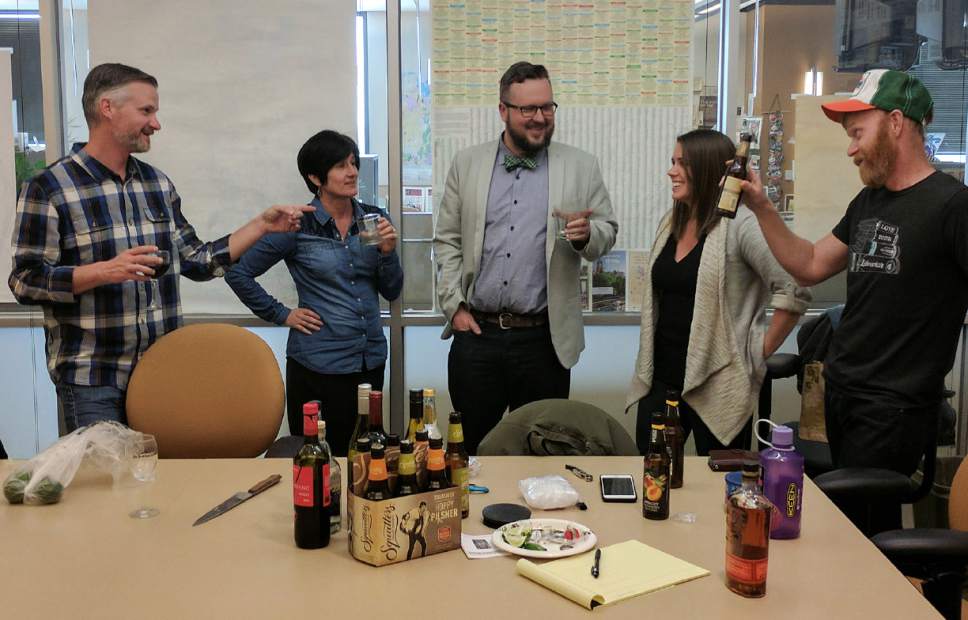This is an archived article that was published on sltrib.com in 2017, and information in the article may be outdated. It is provided only for personal research purposes and may not be reprinted.
Hospitality and tourism groups are staging a frenzied push to try to persuade Gov. Gary Herbert to veto a bill on his desk that would drop Utah's legal standard for drunken driving to the lowest in the country.
The National Transportation Safety Board has pushed Utah lawmakers hard to be the first state to adopt the 0.05 blood alcohol content standard, and lawmakers, in their zeal to be tough on drunk driving, obliged.
It's a tricky proposition for social drinkers trying to figure out what the new law might mean.
So a group of us got together Wednesday evening and put the new 0.05 standard to the test. We had men and women drinking different types of alcohol and had Chris Bertram, a retired Holladay police chief and now an instructor and consultant, administer field sobriety tests which we then checked with a portable Breathalyzer.
You can watch the video above, but we learned a few things from the exercise.
First, the women were right around 0.05 after two drinks in the span of an hour, whether it was Utah-strength beer or measured pours of wine or liquor. The men were crossing the threshold around their third drink in a little over an hour.
So when the sponsor of the bill, Rep. Norm Thurston, recently told restaurateurs that someone could have six beers in an hour and still be under 0.05, he's way off the mark.
In reality, a couple glasses of wine with dinner, and suddenly that couple celebrating an anniversary or old friends catching up over a beer could end up in jail.
More importantly, it showed us that there really is no way for an experienced officer, even one like Bertram with 25 years in uniform, to discern when someone crosses that 0.05 threshold.
Others in law enforcement have acknowledged as much, including state Rep. Lee Perry, a Utah Highway Patrol lieutenant, who told me that he voted for the legislation because it makes a statement, even though troopers like himself can't realistically tell if a driver is impaired at 0.05 blood alcohol.
In other words, this is a message bill, intended to give people warm, fuzzy feelings but really accomplishes almost nothing in terms of making our roads safer.
Our experiment also demonstrated how subjective the field sobriety tests can be. For example, I failed the field test at 0.03, but passed it (barely) at 0.11. A wobble here or a misstep there and an officer can arrest a driver who may or may not actually be impaired.
"If we're going to 0.05, wow, we're going to have to train officers in a completely different manner," Bertram said, and the ability to test for the new standard will likely be tested in court.
And if a trained police officer conducting a battery of tests can't tell with certainty if a driver is impaired at 0.05, are we really asking bartenders or waiters and waitresses to make those calls when they're deciding whether to stop serving a patron?
That's precisely what we do. Under Utah's dram shop law, bars and restaurants and the servers who work in them can face as much as $2 million liability, and even potential criminal charges, if a guest leaves their establishment and causes an accident.
The subjective nature of the tests also makes the new law ripe for abuse.
We have seen more than a few instances where police officers pressured to show results see what they want to see. Remember UHP Trooper Lisa Steed? She had a reputation as a superstar on the force because of her DUI arrests, until it was discovered she was flouting the law, fudging reports and arresting people who shouldn't have been arrested.
Bertram said, in his experience, some departments have roughly 1 in 7 DUI arrests thrown out or pleaded out.
The new more fungible standard will likely push those numbers even higher, as well as open the door for more racial profiling, as the American Civil Liberties Union recently argued.
There is nothing mystical about 0.05, or 0.08, for that matter. Unless we make the legal limit zero, policymakers are drawing a line somewhere in that gray area, weighing how much risk we, as a society, are willing to accept.
Nationally, alcohol-related crashes account for a third of all fatal traffic accidents. In Utah, because a large portion of the population doesn't drink alcohol, they account for less than 12 percent in 2016, according to the Utah Department of Public Safety. Over three years, DUIs averaged 14 percent of Utah fatal crashes.
You're about three times as likely to be killed in an accident involving speeding and statistically more likely to die from a gunshot than a DUI.
Even under the optimistic projections from the NTSB, changing Utah's law MIGHT save two to three lives a year. I doubt it would be that high.
Other changes could make a bigger dent in curbing drunken driving — tougher penalties for repeat offenders, escalating fines for higher blood alcohol levels, or expanded use of Interlock systems that require a driver to blow into a Breathalyzer before starting a car.
Those are things that Mothers Against Drunk Driving, the leading advocacy group in the country supports. It doesn't support lowering the blood alcohol standard.
The Legislature shouldn't have passed the bill and the governor should veto it.
But don't count on it, and here's why: The new standard won't take effect until Jan. 1, 2019 (another reason to stay in on New Year's), and Herbert can argue that the Legislature can refine the law next year — although the same would be true if he were to veto the bill.
Already, House Speaker Greg Hughes is talking about addressing potential insurance-related issues that they hadn't fully considered.
But for now, there's little upside for the governor, who doesn't want to appear weak on drunk driving, to issue the veto.
That means that next week you'll likely see Utah become the first in the nation to adopt the standard, imposing unworkable expectations on law enforcement and further stigmatizing the state as being hostile to anyone who drinks.
So, cheers, Utah. And make sure you order an Uber.
Twitter: @RobertGehrke









